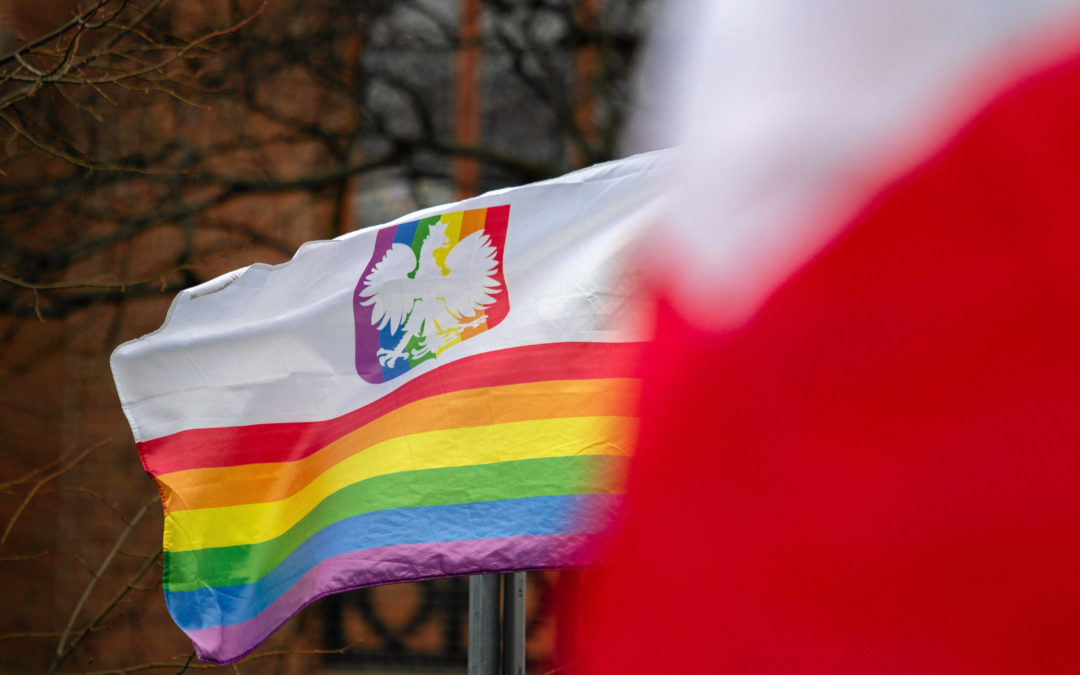This year’s presidential election will decide on whether Poland remains attached to national traditions under the current president, Andrzej Duda, or moves in a dangerous direction under the main opposition challenger, Rafał Trzaskowski, says a senior official from the ruling Law and Justice (PiS) party.
His comments are part of growing signs that anti-LGBT rhetoric will become a central feature of the election campaign, following the opposition’s decision last week to switch candidates.
As mayor of Warsaw, Trzaskowski signed a pledge in support of LGBT rights that became the pretext for PiS and the church to launch attacks on “LGBT ideology” ahead of European and parliamentary elections.
“Rainbow” candidate
“We will have a choice [in these elections] between the white-and-red Poland represented by the current president and a rainbow Poland [of Trzaskowski],” said Krzysztof Sobolewski, chairman of PiS’s executive committee, in an interview with Polskie Radio, referring to the respective colours of the Polish and LGBT flags.
His remarks follow others by senior figures from the ruling camp suggesting that they will seek to associate Trzaskowski with LGBT issues during the campaign. Janusz Kowalski, a deputy minister for state assets, posted a tweet with a rainbow flag next to Trzaskowski’s name, saying that he would be “monitoring” him.
A PiS MP, Tomasz Rzymkowski, tweeted a picture of Trzaskowski superimposed on top of the female candidate he replaced, Małgorzata Kidawa-Błońska, alongside rainbow colours and the name “Rafalala”, a well-known transgender performer and activist (as well as a play on Trzaskowski’s first name).
A więc wszystko jasne. Kandydatem na prezydenta niegdyś konserwatywno-liberalnej PO zwolennik planu Rabieja – Rafał Trzaskowski. Z poparciem lewackich przybudówek PO typu Inicjatywa Polska czy Zieloni. Kiedy kongres zjednoczeniowy z SLD? 😆😆😆 pic.twitter.com/6kzD9yRx8J
— Tomasz Rzymkowski (@TRzymkowski) May 15, 2020
Meanwhile today, Gazeta Polska, a conservative weekly with close ties to PiS, launched a new issue with a cover showing Trzaskowski in front of a rainbow flag alongside the headline “Candidate from the Equality Parade”, a reference to the LGBT pride marches that take place in Polish cities.
Inside, the newspaper warns that Trzaskowski wants to make Poland into “a country where gay teenagers freely kiss each other in schools”. It notes that his deputy mayor in Warsaw, Paweł Rabiej, is a gay man who “ostentatiously posts pictures online of himself lying in bed with his partner or kissing him in public”.
Gazeta Polska last year printed and distributed “LGBT-free zone” stickers, which it encouraged readers to put up in their local areas. Many Polish local authorities, usually under the control of PiS, have also issued resolutions declaring themselves “free from LGBT ideology”.
Już w sprzedaży! Zachęcamy do zakupu najnowszego numeru tygodnika #GazetaPolska. ▫️ https://t.co/P70dar8jjj #tygodnik #sroda #prasa #magazine #trzaskowski #warszawa #wybory #wyboryprezydenckie2020 #czytambolubie #czytamprase pic.twitter.com/GnHE06bKAc
— Gazeta Polska – w każdą środę (@GPtygodnik) May 20, 2020
Illegal signatures?
In his interview with Polskie Radio, Sobolewski also raised concern that Trzaskowski’s campaign may be breaking the law. Presidential candidates require 100,000 supporting signatures from the public to be allowed to stand. They can only begin collecting them once the election period officially begins, which has not happened yet.
However, some media have reported alleged evidence that Trzaskowski’s party, Civic Platform (PO), is already unofficially gathering signatures. The reason for doing so is fear that PiS may seek to call elections with a very short campaign period in which to gather signatures, a task further hindered by the coronavirus epidemic.
“If the media reports that Rafał Trzaskowski has already collected 100,000 signatures are true, it would be breaking the law,” said Sobolewski. “This would put the Civic Coalition and its leadership in a terrible light.”
The leader of PO, Borys Budka, recently told RMF FM that there is no “formal” effort underway to collect signatures. However, he added that he “can’t say whether anyone in Poland is not conducting a spontaneous action” to gather them.
A combative start
Trzaskowski has made a combative start to his (pre-)election campaign since declaring his candidacy on Friday. Over the weekend, he said that as president he would seek to replace the current public television station, TVP, with a new service because the manner in which PiS has used it for “propaganda” is “poisoning our public life”.
He then aroused controversy when, at the same press conference, he responded to a question from the TVP news channel by telling their journalists to “hurry up asking questions because there aren’t many weeks left [for you]”.
In a later online question-and-answer session, Trzaskowski was asked if he would agree to hold a debate with President Duda in English. “I don’t know if I’d be so cruel,” laughed Trzaskowski, in a clear reference to the fact that Duda has sometimes struggled to use English. whereas Trzaskowski reportedly speaks five foreign languages.
💬Czy przyjmie Pan wyzwanie debaty z Andrzejem Dudą w języku angielskim?
Prezydent @trzaskowski_: Nie wiem czy byłbym aż tak okrutny✌️Cały zapis czatu na żywo znajdziecie tutaj👉 https://t.co/FpHsI8GDdO#Trzaskowski2020 pic.twitter.com/QDzHcnpGTA
— Trzaskowski2020 (@trzaskowski2020) May 19, 2020
Trzaskowski’s entry into the race appears to have given his party’s chances a big boost. Polls taken since Friday show him in second place, with around 15% of the vote. That is well behind Duda’s 43%, but enough to enter the second-round run-off, in which Trzaskowski would hope to scoop up many of the votes from other opposition candidates who finished third or below.
By contrast, Kidawa-Błońska, after starting as favourite to challenge Duda, had slipped to fourth or fifth in the polling, following a campaign that she herself admitted had left voters confused.
Main image credit: Roman Bosiacki / Agencja Gazeta

Daniel Tilles is editor-in-chief of Notes from Poland. He has written on Polish affairs for a wide range of publications, including Foreign Policy, POLITICO Europe, EUobserver and Dziennik Gazeta Prawna.




















